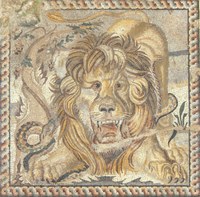Monuments
There are many monuments and places that testify to the charm, the historical and cultural values, and highlith the importance of the urban and architectural planning of the City of Teramo. Beginning in the heart of the old town where today it is still possible to admire the ruins of the Roman theatre built in the 30 b. C.
the visible ruins give an idea of the remarkable dimensions of the Theatre: the coming togheter of the travertine sitting steps, laying on 20 supporting arches, originally having a covered diameter of 78 meters, which allowed the hall to house another 3000 spectators. Near the Theatre stood the Amphitheatre, whose construction dates back to the 1st century a.C. and today only some pieces of external wall remain.
The precious Lion Mosaic, dated to the 1st century b.C. and located in the homonymous Domus, very close to the antique Forum of the City. The splendid emblem, with its Hellenistic origins, represents a lion near a plane tree and a spring that claws with its right paw a snake wrapped around its paws. This is the most beautiful piece of Roman art in Teramo, similar in style to the mosaics found in the Villa of Adriano in Tivoli and Pompei. Thanks to careful restauration work, the mosaic can be seen in its full splendor.
Dating back to Byzantini times, the antique cathedral, today named Sant'Anna, is built on a roman temple. The interior can be reached by crossing the marvellous mosaic floor, probably taken from another roman building from which the columns with Corinthian marble capitals were probably also sourced.
Of interestest the middle bay with cross vaults and big groins, the only testimony of the original central nave. Behind the altar, at last, you can admire the frescos with an immage of the Virgin Mary. In the wide stretch at the rear of the Church there are the ruins of the Monumental “Torre Bruciata” and of the roman area.
Not far, the Sant'Antonio Church dated 1227 and Romanesque San Domenico Church with medieval fresco remains, also present in the suggestive but cramped Cloister.
Also worth visiting is the San Giovanni Convent with its small restaured cloister and the Madonna delle Grazie Church (1153),once known as Sant'Angelo delle Donne, a monastry of Benedictine Nuns. The ex-votos conserved in the vestry have a big historical and religios significance.
In the old town there are the 14th century buildings of Palazzo Vescovile and of the Loggia del Municipio, Casa Capuani in via Veneto, and the new location of the Biblioteca Provinciale, housed in the 16th century Palazzo Delfico. A visit to the Archeological Museum will help you to understand the historical origins of the city and the Pinacoteca (civic picture gallery), in the shady Villa Comunale, demonstrates the greatness of teramana painting in the 19th century.
